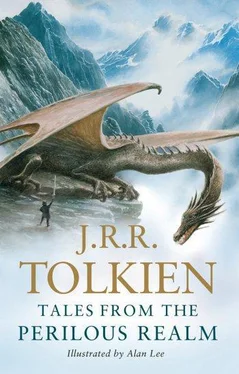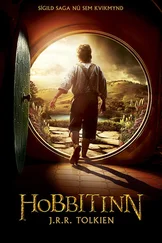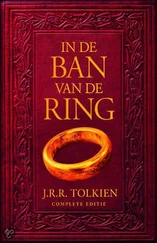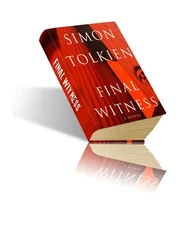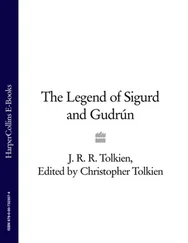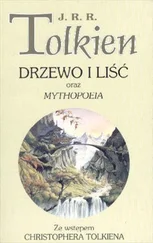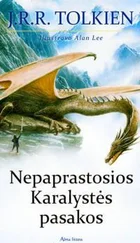"Dear, dear!" said Niggle. "You are unlucky. I hope it is no more than a cold that your wife has got. I'll come round presently, and help you move the patient downstairs."
"Thank you very much," said Parish, rather coolly. "But it is not a cold, it is a fever. I should not have bothered you for a cold. And my wife is in bed downstairs already. I can't get up and down with trays, not with my leg. But I see you are busy. Sorry to have troubled you. I had rather hoped you might have been able to spare the time to go for the doctor, seeing how I'm placed: and the builder too, if you really have no canvas you can spare."
"Of course," said Niggle; though other words were in his heart, which at the moment was merely soft without feeling at all kind. "I could go. I'll go, if you are really worried."
"I am worried, very worried. I wish I was not lame," said Parish.
So Niggle went. You see, it was awkward. Parish was his neighbour, and everyone else a long way off. Niggle had a bicycle, and Parish had not, and could not ride one. Parish had a lame leg, a genuine lame leg which gave him a good deal of pain: that had to be remembered, as well as his sour expression and whining voice. Of course, Niggle had a picture and barely time to finish it. But it seemed that this was a thing that Parish had to reckon with and not Niggle. Parish, however, did not reckon with pictures; and Niggle could not alter that. "Curse it!" he said to him self, as he got out his bicycle.
It was wet and windy, and daylight was waning. "No more work for me today!" thought Niggle, and all the time that he was riding, he was either swearing to himself, or imagining the strokes of his brush on the mountain, and on the spray of leaves beside it, that he had first imagined in the spring. His fingers twitched on the handlebars. Now he was out of the shed, he saw exactly the way in which to treat that shining spray which framed the distant vision of the mountain. But he had a sinking feeling in his heart, a sort of fear that he would never now get a chance to try it out.
Niggle found the doctor, and he left a note at the builder's. The office was shut, and the builder had gone home to his fireside. Niggle got soaked to the skin, and caught a chill himself. The doctor did not set out as promptly as Niggle had done. He arrived next day, which was quite convenient for him, as by that time there were two patients to deal with, in neighbouring houses. Niggle was in bed, with a high temperature, and marvellous patterns of leaves and involved branches forming in his head and on the ceiling. It did not comfort him to learn that Mrs. Parish had only had a cold, and was getting up. He turned his face to the wall and buried himself in leaves.
He remained in bed some time. The wind went on blowing. It took away a good many more of Parish's tiles, and some of Niggle's as well: his own roof began to leak. The builder did not come. Niggle did not care; not for a day or two. Then he crawled out to look for some food (Niggle had no wife). Parish did not come round: the rain had got into his leg and made it ache; and his wife was busy mopping up water, and wondering if "that Mr. Niggle" had forgotten to call at the builder's. Had she seen any chance of borrowing anything useful, she would have sent Parish round, leg or no leg; but she did not, so Niggle was left to himself.
At the end of a week or so Niggle tottered out to his shed again. He tried to climb the ladder, but it made his head giddy. He sat and looked at the picture, but there were no patterns of leaves or visions of mountains in his mind that day. He could have painted a far-off view of a sandy desert, but he had not the energy.
Next day he felt a good deal better. He climbed the ladder, and began to paint. He had just begun to get into it again, when there came a knock on the door.
"Damn!" said Niggle. But he might just as well have said "Come in!" politely, for the door opened all the same. This time a very tall man came in, a total stranger.
"This is a private studio," said Niggle. "I am busy. Go away!"
"I am an Inspector of Houses," said the man, holding up his appointment-card, so that Niggle on his ladder could see it. "Oh!" he said.
"Your neighbour's house is not satisfactory at all," said the Inspector.
"I know," said Niggle. "I took a note to the builders a long time ago, but they have never come. Then I have been ill."
"I see," said the Inspector. "But you are not ill now."
"But I'm not a builder. Parish ought to make a complaint to the Town Council, and get help from the Emergency Service."
"They are busy with worse damage than any up here," said the Inspector. "There has been a flood in the valley, and many families are homeless. You should have helped your neighbour to make temporary repairs and prevent the damage from getting more costly to mend than necessary. That is the law. There is plenty of material here: canvas, wood, waterproof paint."
"Where?" asked Niggle indignantly.
"There!" said the Inspector, pointing to the picture.
"My picture!" exclaimed Niggle.
"I dare say it is," said the Inspector. "But houses come first. That is the law."
"But I can't..." Niggle said no more, for at that moment another man came in. Very much like the Inspector he was, almost his double: tall, dressed all in black.
"Come along!" he said. "I am the Driver."
Niggle stumbled down from the ladder. His fever seemed to have come on again, and his head was swimming; he felt cold all over.
"Driver? Driver?" he chattered. "Driver of what?"
"You, and your carriage," said the man. "The carriage was ordered long ago. It has come at last. It's waiting. You start today on your journey, you know."
"There now!" said the Inspector. "You'll have to go; but it's a bad way to start on your journey, leaving your jobs undone. Still, we can at least make some use of this canvas now."
"Oh, dear!" said poor Niggle, beginning to weep. "And it's not, not even finished!"
"Not finished?" said the Driver. "Well, it's finished with, as far as you're concerned, at any rate. Come along!"
Niggle went, quite quietly. The Driver gave him no time to pack, saying that he ought to have done that before, and they would miss the train; so all Niggle could do was to grab a little bag in the hall. He found that it contained only a paint-box and a small book of his own sketches: neither food nor clothes. They caught the train all right. Niggle was feeling very tired and sleepy; he was hardly aware of what was going on when they bundled him into his compartment. He did not care much: he had forgotten where he was supposed to be going, or what he was going for. The train ran almost at once into a dark tunnel.
Niggle woke up in a very large, dim railway station. A Porter went along the platform shouting, but he was not shouting the name of the place; he was shouting Niggle!
Niggle got out in a hurry, and found that he had left his little bag behind. He turned back, but the train had gone away.
"Ah, there you are!" said the Porter. "This way! What! No luggage? You will have to go to the Workhouse."
Niggle felt very ill, and fainted on the platform. They put him in an ambulance and took him to the Workhouse Infirmary.
He did not like the treatment at all. The medicine they gave him was bitter. The officials and attendants were unfriendly, silent, and strict; and he never saw anyone else, except a very severe doctor, who visited him occasionally. It was more like being in a prison than in a hospital. He had to work hard, at stated hours: at digging, carpentry, and painting bare boards all one plain colour. He was never allowed outside, and the windows all looked inwards. They kept him in the dark for hours at a stretch, "to do some thinking," they said. He lost count of time. He did not even begin to feel better, not if that could be judged by whether he felt any pleasure in doing anything. He did not, not even in getting into bed.
Читать дальше
